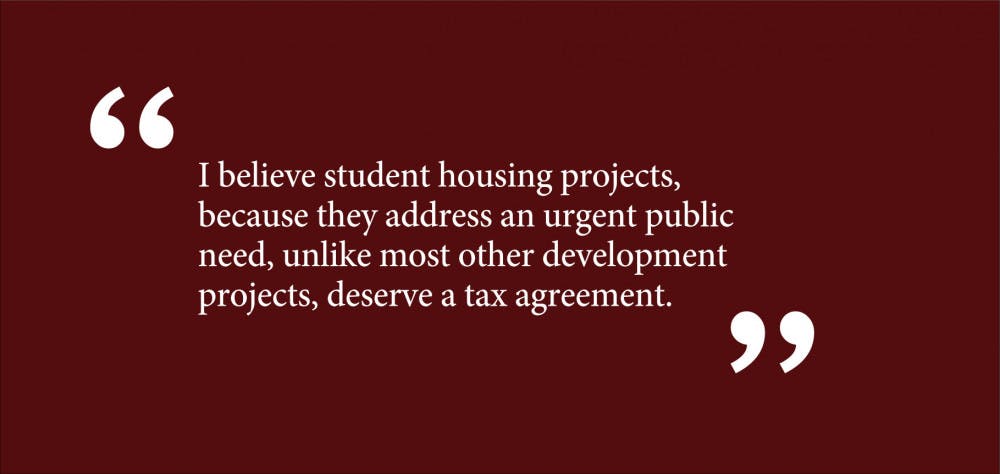In an Oct. 19 op-ed, Colin Kent-Daggett ’19 made a simplistic and misguided argument against Edge College Hill II — the new luxury student housing development on Canal Street — in a rebuttal to my column published earlier that week. I have to thank Kent-Daggett for his harsh and highly personal criticism, as it encouraged me to re-examine my argument from a new perspective and reformulate some of the points I had originally made. However, that is the extent of the praise I can offer Kent-Daggett. His analysis doesn’t “dredge much deeper” than a cursory review of slum clearance, a not-so-slick-math comparison of median household incomes and a simple claim that I am part of a “much larger problem.” I was, and still am, highly cognizant of these issues, yet their existence alone does not justify the total shutdown of all real estate development other than affordable housing. Building on the points I made in my Oct. 15 column, I believe Providence is still justified in granting the $19 million property tax relief to student housing (a relevant public issue), but going forward, the City should set up a direct funding program to local public housing authorities and should reduce the amount of tax relief it grants to future developments.
First, the warped framework connecting federal and local government institutions to the lives of low-income Providence residents has created a system of perverse incentives that allows the City to grant tax breaks with little consequence. Kent-Daggett did not mention this, but the City of Providence does not directly fund or subsidize low-income housing out of its own budget. Instead, it repurposes federal money, usually allocated by the U.S. Department of Housing and Urban Development through programs like the Community Development Block Grant system or the Home Investment Partnership Program for affordable housing development. There are also local public housing authorities, such as Rhode Island Housing, that sponsor public housing projects; these entities are “self-sustaining” and usually generate their own operating income without state funding. This means that Providence can approve tax breaks that bolster city coffers and precipitate gentrification without compensating Rhode Island Housing and the Providence Community Development Department, who are then left to grapple with the inequitable side-effects of said tax breaks. The system, as it stands, encourages the City to hand out tax reduction frivolously — a practice that started with Providence Place Mall’s payment-in-lieu-of-taxes program and has more recently made possible a potential $18.5 million public subsidy to Hope Point Tower. To address this miscalibration of incentives, I believe the City should voluntarily carve out a portion of its annual budget toward financing affordable housing in Providence, so that it is forced to exercise a level of discipline when deciding on tax agreements.
Second, I think that the City should gradually ramp down its well-established policy of granting tax stabilization agreements over time, as it is ultimately not the role of the City to make the financing of projects easier for developers. The city has granted 69 tax breaks to development projects since 1996, according to WPRI. That is ludicrous — equivalent to at least three tax breaks a year. These tax breaks artificially boost a development’s financials to achieve a market-rate return on cost, essentially the financial hurdle that determines whether a project is constructed. Many developers (cough, cough, Jason Fane) play a game of chicken with the City, complaining about low return on cost and project feasibility until the City caves with a tax agreement. The City needs to realize that this practice is self-reinforcing and that if it is serious about saving money, it needs to be okay letting developers walk away from a few projects. So what if Fane doesn’t like the risk-return profile of Hope Point Tower without a tax break? The real estate market will find someone else who does. It ultimately is not up to the City to step in and make Fane’s life easier. The same should follow for any real estate developer in Providence.
That being said, I believe student housing projects, because they address an urgent public need, unlike most other development projects, deserve a tax agreement. The fact that the average Brown student household income is significantly higher than the average Providence household income does not immediately subordinate student problems to low-income problems in some sort of hierarchy. I don’t see the point in creating a totem pole of whose problems are more important; this does not need to be zero-sum game. Student housing is a major issue in Providence. Student-rented houses on the East Side are usually overcrowded with students, usually stuffed in converted-attic units that often do not comply with zoning or fire code occupancy standards. Many of these houses also present a nuisance to long-time neighbors because of noise complaints. This is a problem, not only for students, but for East Side residents. Edge College Hill II would introduce competitive new supply into a supply-starved market — there is clearly more to be gained than lost on a tax agreement.
Yes, slum clearance happened in Providence. Yes, Brown students are wealthier than most residents of Providence. The City’s decision to grant Edge College Hill II a tax break is still justified. There are some things the City needs to change about its current approach toward development.
Andrew Friedman '19 can be reached at andrew_friedman@brown.edu. Please send responses to this opinion to letters@browndailyherald.com and other op-eds to opinions@browndailyherald.com.





